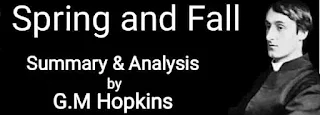Spring and Fall Summary and Analysis by G. M Hopkins
Spring and Fall was written on September 7, 1880 at Rose Hill, Lydiate, a few miles outside Liverpool. The poem is dedicated to a child. Here Hopkins returns to the theme of transient innocence.
The poet addresses the child in adult measured tones about what later life must invariably bring; or what is the inevitability in our life. The poem is one of Hopkins's most charming and popular lyric. Hopkins had a particular child in mind, and for that the poem is of unusual simplicity.
Spring and Fall Summary
The poem opens with a tender and gentle address by a father confessor to an imaginary child, Margaret who is very sensitive to nature. She is sad at the sight of the leaves falling in autumn. The poet reflects on her sadness and speculates that she is weeping over the falling of leaves. He asks her if she is so upset because the leaves in the grove are falling or whether she is weeping for a similar mortality in human world.
At the moment, she is young enough to give the same weight of sadness to falling leaves as she does to things affecting people. Margaret cares just as much about small tragedies in nature (like leaves falling off of trees in the autumn) as she does about bigger, human problems (the things of man). The poet finds her grieving over the trees in the grove getting leafless and their beauty fading away.
She is equally sensitive to the minor tragedy of nature and to the big tragedy of human life. He asks her not to be so sensitive. He says, as she grows older, she will also feel that she is more able to analyze the causes of her own sadness. However, the poet suggests that her rational analysis will be faulty. The young girl, Margaret, has no suitable words (mouth) for, nor a real understanding (mind) of, her grief.
So, it is difficult for her to express the sources of sadness. The true source of all human sadness is that humans are born with original sin and are mortal. The poet emphasizes the sad transiency of all things due to the curse of Adam's original sin and future sadness is, in reality, a mourning for herself.
Spring and Fall analysis
Hopkins's poem Spring and Fall is a magnificent lyric which provokes a deep thought or philosophy about human life. At the bottom of the poem lies a contrast between innocence and experience. between age and youth. The young girl becomes a symbol of spring who represents something of the innocent mind and “Mayday in girl and boy”.
The word ‘fall’ in this poem has got a very deep and significant meaning. The word has been explained by critics as the fall of mankind or degradation. All the things in this world is inevitable to be perished. Superficially the word ‘fall’ implies the fall of leaves in the season of Autumn. The poet compares this fall of leaves with that of the fall of human being; death is inevitable and beauty and youth are to be faded away at the course of time.
Human beings are nothing but a part of Nature and bound by the same law of Nature. To quote Mackenzie: ‘She certainly seems to be in harmony with Nature, though the perpetual Spring which earth's sweet being enjoyed in Eden has become merely seasonal, the Fall of man having been accompanied by the years fall which strips trees bare. The movement of the poem is from joy to sadness, from the freshness of youth to the sadness of old age, from Spring to Autumn.
In the opening couplet we are presented with the basic situation out of which the poem arises and in which it remains: the confrontation between Margaret grieving and “Goldengrove unleaving”. The child with her “fresh thoughts” and the association of her name with pearls and daisies may be said to represent the spring of life. The “unleaving” trees of “Goldengrove” may be seen as representing the year's fall (or autumn).
Hence the title. But there is a deeper significance of the title. The poet expresses his surprise and admiration at the philosophical manner in which the child can care for the fallen leaves.
The poet with a deep grief reveals the idea that it is only the young in heart who weep over the fallen leaves of autumn; as the heart grows older, it becomes accustomed to such sights and ob- serves them coldly without feeling, “Though worlds of wanwood leafmeal lie”. Yet even if the little growing up girl develops a colder heart she will have ample cause to lament her human condition.
Then, she will know why she is weeping. The causes of sorrow though apparently different for children and for adults are all fundamentally the same; i.e. the original separation of creatures from their creator, which underlies all human miseries. The expression Spring and Fall has the deeper, theological significance of the title.
The spring is a tragedy of human life and human origin that no mind ever aptly conceived or has appropriately expressed though the instinctive heart or the inmost spirit of man does recognize it. Such then is the blight of original sin in which man is born into this world, and for which he has to pay the penalty. On this pessimistic note Hopkins closes his poem. To quote a critic, the poem is one of Hopkins's “most charming and deservedly popular, yet one of his saddest and most pessimistic poems.”
The reason behind this sad and pessimistic mood of the poem is that Hopkins was at that time living at Liverpool which he thought to be“"of all places the most museless, a most miserable and unhappy spot”. In a letter to Bridges, he spoke of the poem as “a little piece composed since I began this letter, not founded on any real incident. I am not well satisfied with it”.




